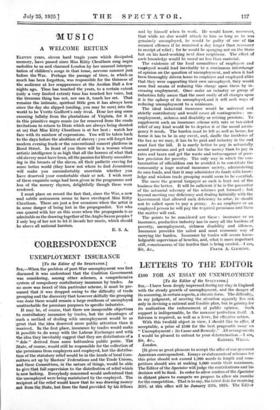CORRESPONDENCE
UNEMPLOYMENT INSURANCE
[To the Editor of the SPECTATOR.] Sm,—When the problem of post-War unemployment was first discussed it was understood that the Coalition Government was considering, among other schemes, a comprehensive system of compulsory contributory insurance by trades. As no more was heard of this particular scheme, it must be pre- sumed that it was dropped owing to the difficulty of trade grouping and the discovery that however skilfully the grouping was done there would remain a large residuum of unemployed unattachable for premium purposes to specific industries.
It may be, of course, that there are insuperable objections to contributory insurance by trades,• but the advantages .of such a method of dealing with unemployment would be so ;great that the' idea deserved more public attention than it received. In the first place, insurance by trades would make it possible to-do away with the Labour Exchanges and with the idea they inevitably suggest that they are distributors of a " dole " derived from some bottomless public purse. The State, of course, would still be responsible for the collection of the premiums from employers and employed, but the distribu- tion of the statutory relief would be in the hands of local Com- mittees set up by Masters' Federations and the Trade Unions, and these Committees, in the nature of things, would be able, to give that full supervision to the distribution of relief which is now lacking. Everybody concerned would understand that the unemployed were being maintained by the employed. The recipient of the relief would know that he was drawing money not from the State, but from the fund provided by his fellows and by himself when in work. He would know, morrover, that while no slur would attach to him so long as he was'
genuinely unemployed, he would be guilty of one - of the meanest offences if he remained a day longer than necessary in receipt of relief ; for he would be sponging not on the State but on his hard-working next door neighbour. The effect of such knowledge would be moral no less than material.
The existence of the local committees of employers and employed would lead inevitably to a continuous interchange of opinion on the question of unemployment, and when it had been thoroughly driven home to employer and employed alike that they were supporting their own unemployed, they would
soon find means of redwing this charge upon them by in- creasing employment. Once make an industry- or group of industries fully aware that the most costly of all charges upon it is the upkeep of its unemployed, and it will seek ways of reducing unemployment to a minimum.
The ideal industrial insurance would be universal and strictly contributory and would cover all contingencies : un- employment, siclmess and disability or retiring pensions. To supplement such an insurance scheme with rate or tax-aided relief of any kind would be to deprive it of the moral astrin- gency it needs. The burden must be felt as well as borne, for borne it has to be in any event, and, shuffle the incidence of the tax as we may, it has to be paid and industry in the end, must foot the bill. It is surely better to pay in actuarially; sound premiums and get value for the money than to pay in rates and taxes and get the waste and extravagance of poor- law provision for poverty. The only way in which the con- tamination of officialdom can be avoided is to constitute the community a huge mutual insurance society, administering its own funds, and that it may administer its funds with know- ledge and wisdom trade grouping would seem to be essential.
The more the general taxpayer as such is kept out of the business the better. It will be sufficient if he is the guarantor of the actuarial solvency of the schemes put forward but beyond meeting any deficiency and dealing faithfully with the Government that allowed such deficiency to arise, he should not be called upon to pay a penny. As an employer or an employed person he will pay the required premiums and there the matter will end.
The points to be considered are these : insurance or no insurance, productive industry has to carry all the burdens of poverty, unemployment, sickness disability and idleness. Insurance provides the safest and most economic way of carrying the burden. Insurance by trades will secure know- ledgeable supervision of benefits, and, what is more important still, consciousness of the burden that is being carried.—I am,


























































 Previous page
Previous page